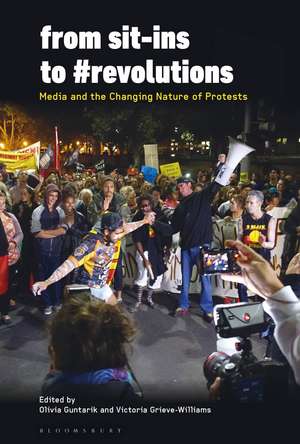From Sit-Ins to #revolutions: Media and the Changing Nature of Protests
Editat de Dr. Olivia Guntarik, Dr. Victoria Grieve-Williamsen Limba Engleză Paperback – 28 iul 2021
| Toate formatele și edițiile | Preț | Express |
|---|---|---|
| Paperback (1) | 219.39 lei 6-8 săpt. | |
| Bloomsbury Publishing – 28 iul 2021 | 219.39 lei 6-8 săpt. | |
| Hardback (1) | 571.66 lei 6-8 săpt. | |
| Bloomsbury Publishing – 22 ian 2020 | 571.66 lei 6-8 săpt. |
Preț: 219.39 lei
Preț vechi: 275.77 lei
-20% Nou
Puncte Express: 329
Preț estimativ în valută:
41.98€ • 43.94$ • 34.94£
41.98€ • 43.94$ • 34.94£
Carte tipărită la comandă
Livrare economică 31 martie-14 aprilie
Preluare comenzi: 021 569.72.76
Specificații
ISBN-13: 9781501384066
ISBN-10: 1501384066
Pagini: 320
Ilustrații: 7 bw illus
Dimensiuni: 152 x 229 mm
Greutate: 0.43 kg
Editura: Bloomsbury Publishing
Colecția Bloomsbury Academic
Locul publicării:New York, United States
ISBN-10: 1501384066
Pagini: 320
Ilustrații: 7 bw illus
Dimensiuni: 152 x 229 mm
Greutate: 0.43 kg
Editura: Bloomsbury Publishing
Colecția Bloomsbury Academic
Locul publicării:New York, United States
Caracteristici
Interrogates key concepts in political communication: activism, participation, and community
Notă biografică
Olivia Guntarik is an Associate Professor at RMIT University, Australia, who researches the intersections and influences of creativity and technology on activism. Her work draws on art as tools for change, empowerment and dialogue. Victoria Grieve-Williams is an Adjunct Professor at RMIT University, Australia, who utilizes interdisciplinary approaches to progress transnational Indigenous knowledges. She is engaged with new theoretical approaches to dealing with global inequalities.
Cuprins
Table of Contents Introduction 1. 'Together we are more': New mediums for old tales Victoria Grieve-Williams (University of Sydney, Australia) and Olivia Guntarik (RMIT University, Australia) Part I: History in Perspective 2. 'We have survived the white man's world': A critical review of Aboriginal Australian activism in media and social media Victoria Grieve-Williams (University of Sydney, Australia) 3. A historically shifting sphere: The internet as a basis of a public sphere for social activism in the United States Wesley Bishop (Marian University, USA) 4. Subversive networks of feminism: The 'Radical Women's Press' in the United States, 1830-2010 Ana Stevenson (University of the Free State, South Africa) 5. Evolution of hacktivism: From origins to now Marco Romagna (Researcher, Centre of Expertise Cyber Security and The Hague University of Applied Sciences, Netherlands) 6. The Liga Femenil Mexicanista: The protofeminism and radical organizing of journalist Jovita Idár Annette M. Rodríguez (University of North Carolina, USA) Part II: The Art of Activism 7. 'Reggae became the main transporter of our struggle.. and our love': Willie Brim - Cultural Custodian, Bush Doctor and Songman of the Buluwai people of North Queensland Victoria Grieve-Williams (University of Sydney, Australia) 8. Cockpit Country Dreams: Film, media and protest in the long journey to save Jamaica's Cockpit Country Esther Figueroa (Independent filmmaker, writer, educator, and linguist) 9. The hacktivist cultural archive: From science fiction to Snowden, worms to the Women's March Nicholas M. Kelly (University of Iowa, USA) 10. On solitude and solidarity Olivia Guntarik (RMIT University, Australia) and Verity Trott (University of Melbourne, Australia) Part III: Ecologies of Place 11. Facebook, WhatsApp and selective outrage: The impact of digital activism on the intersectional identities of anti-rape feminist activists in India Pallavi Guha (Towson University, USA) 12. #SocialMediaAffordances: A consideration of the impact of Facebook and Twitter on the Green Movement Mina Momeni (University of Tortonto Scarborough and University of Guelph-Humber, Canada) 13. Examining the alt-right: A media analysis of hate speech through Bendigo's anti-Muslim protests Grace Taylor (RMIT University, Australia) 14. Connective crowds: The organizational structure of a feminist crowd in the #TakeDownJulienBlanc campaign Verity Trott (University of Melbourne, Australia) Part IV: Memory and Materiality 15. Grassroots feminist music activism: Finding a place in the archives Catherine Strong (RMIT University, Australia) 16. Postal mail, digital platforms and exhibitions: Mobilizing publics to end the carceral state Jose Luis Benavides (Artist, filmmaker, and educator), Erica R. Meiners (Northeastern Illinois University, USA), Sarah Padilla (Independent researcher, USA), Therese Quinn (University of Illinois, USA) and Matthew Yasuoka (Loyola University School, USA) 17. Victims go viral: Digitally dismantling racist lynching in the United States Karoline Summerville (University of North Carolina, USA) 18. Responsibility without sovereignty: Inaugurating a maternal contract to find the Mexican 'disappeared' through protest and social media Elva Fabiola Orozco Mendoza (Texas Christain University, USA) 19. On the concept of progress Olivia Guntarik (RMIT University, Australia) Notes on Contributors Index
Recenzii
Friend or foe? Or both? To what degree has the internet helped or hindered progressive movements the world over? Have its champions swallowed the bait? This absorbing collection, largely from the Global South, provides us with histories with which we can make our next steps in this tormented field.
